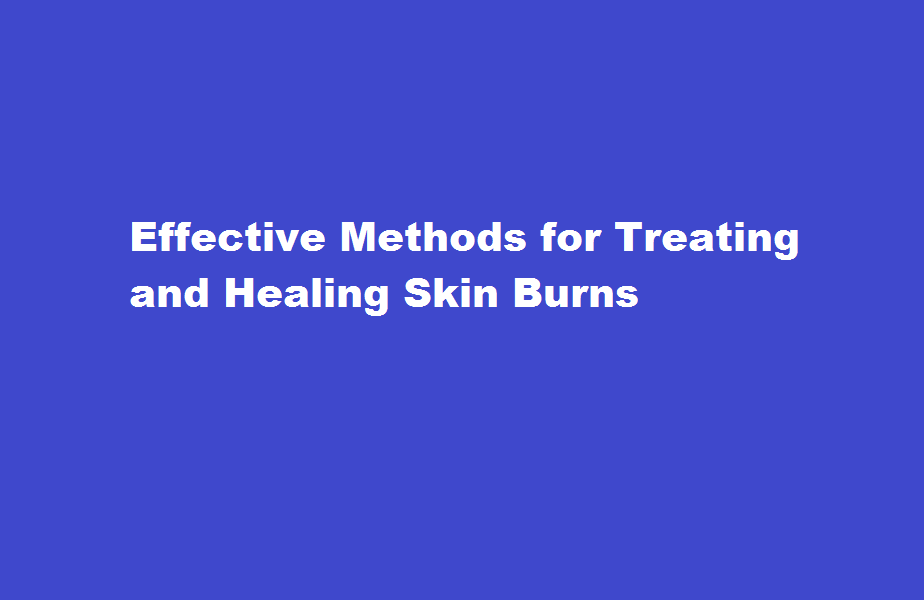Effective Methods for Treating and Healing Skin Burns
3 min read
Introduction
Skin burns can occur due to various reasons, such as direct contact with hot objects, chemicals, or exposure to fire. Treating burns promptly and correctly is essential to minimise pain, prevent infection, and promote faster healing. In this article, we will discuss effective methods to cure skin burns and provide valuable insights into their management.
Assessing the Burn
The first step in treating a skin burn is to assess its severity. Burns are classified into three categories: first-degree, second-degree, and third-degree. A first-degree burn affects the outermost layer of the skin, resulting in redness, pain, and minor swelling. Second-degree burns involve the second layer of the skin, causing blistering, intense pain, and swelling. Third-degree burns are the most severe, damaging all layers of the skin and potentially affecting deeper tissues. It is crucial to identify the burn type to determine the appropriate treatment approach.
Immediate First Aid
For minor burns, immediate first aid can help alleviate pain and prevent further damage. Start by cooling the burn with cold running water for at least 10 minutes. Avoid using ice as it may cause additional harm. Afterward, gently clean the area with mild soap and water. Do not apply any ointments, creams, or adhesive bandages to the burn. If blisters form, leave them intact to protect the underlying skin. Cover the burn with a sterile, non-stick dressing or clean cloth to prevent infection.
Over-the-Counter Remedies
Several over-the-counter products can aid in the healing process of minor burns. Topical creams or ointments containing ingredients like aloe vera, lidocaine, or hydrocortisone can provide relief from pain and reduce inflammation. However, it is essential to follow the instructions and consult a healthcare professional if the burn worsens or does not improve within a few days. Additionally, oral pain relievers like ibuprofen or acetaminophen can help alleviate pain and reduce inflammation.
Natural Remedies
Natural remedies can complement conventional treatments for burns. Aloe vera gel, known for its soothing properties, can be applied topically to promote healing and relieve pain. Honey, with its antibacterial properties, can aid in preventing infection. However, it is crucial to ensure the honey used is sterile and medical-grade. Calendula ointment, chamomile tea compresses, and lavender oil diluted in a carrier oil are other natural remedies known for their anti-inflammatory and wound-healing properties. While natural remedies can be beneficial, it is important to consult a healthcare professional before using them, especially for severe burns.
Seeking Medical Attention
Serious burns, particularly second- and third-degree burns, require immediate medical attention. Medical professionals can assess the severity of the burn, administer appropriate treatment, and prevent complications. They may clean the burn, prescribe antibiotics to prevent infection, and recommend tetanus shots if necessary. In some cases, surgical intervention, such as skin grafting, may be required to promote healing and reduce scarring. Follow-up care is crucial to monitor the progress and ensure proper wound healing.
Frequently Asked Questions
What is the best way to heal burned skin?
Immediately immerse the burn in cool tap water or apply cold, wet compresses. Do this for about 10 minutes or until the pain subsides. Apply petroleum jelly two to three times daily. Do not apply ointments, toothpaste or butter to the burn, as these may cause an infection.
How do you treat a burn everyday?
Wash the burn every day with a mild soap and water. Don’t use hydrogen peroxide or alcohol, which can slow healing. Gently pat the burn dry after you wash it. Apply a thin layer of antibiotic ointment or petroleum jelly on the burn.
Conclusion
Timely and appropriate treatment is essential for curing skin burns effectively. Assessing the severity of the burn, providing immediate first aid, and using over-the-counter or natural remedies can aid in the healing process for minor burns. However, for severe burns, it is crucial to seek medical attention promptly. By following these guidelines and consulting healthcare professionals, individuals can promote healing, alleviate pain, and minimise complications associated with skin burns.
Read Also : Breaking Free from Sugar Strategies for a Healthier Lifestyle






